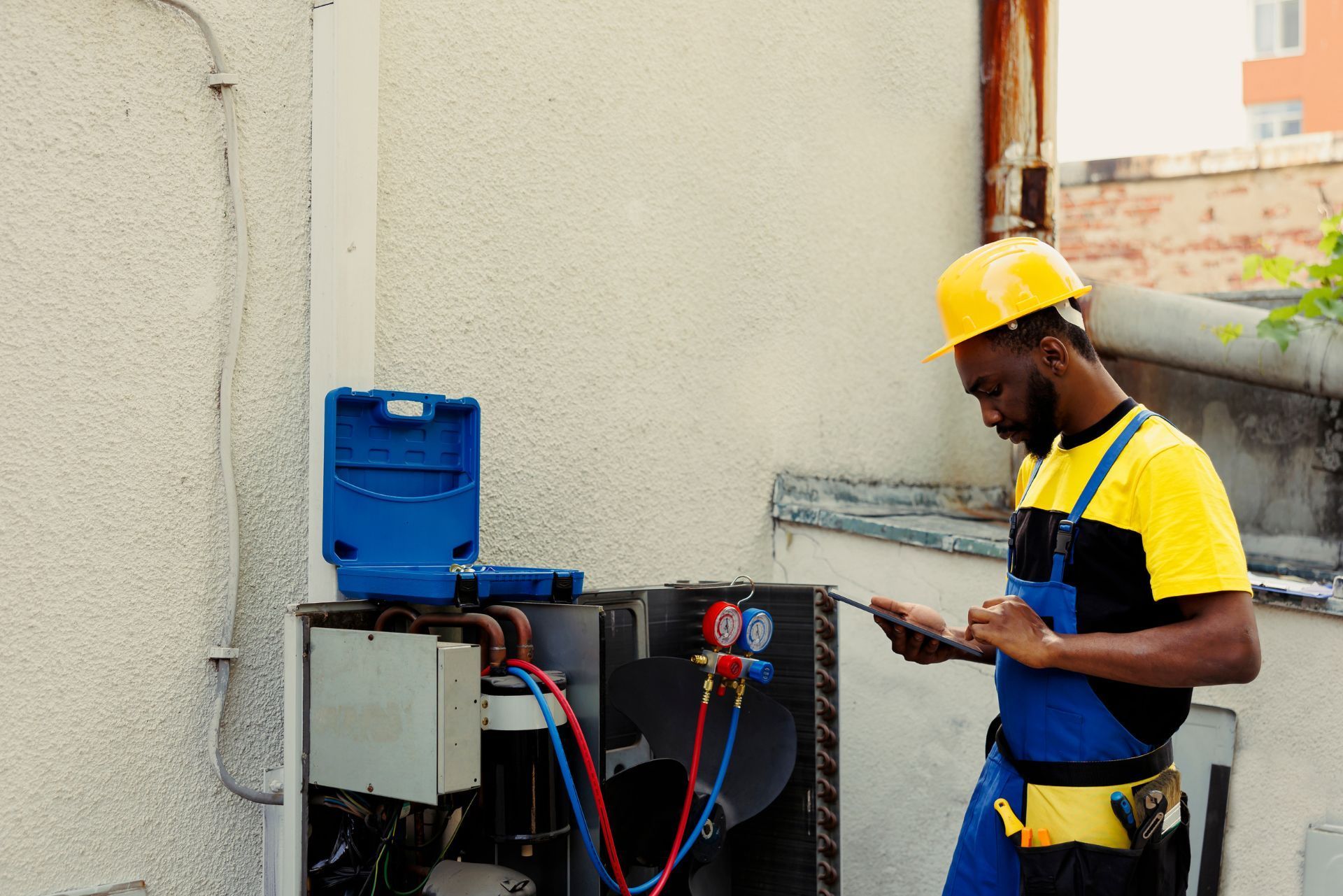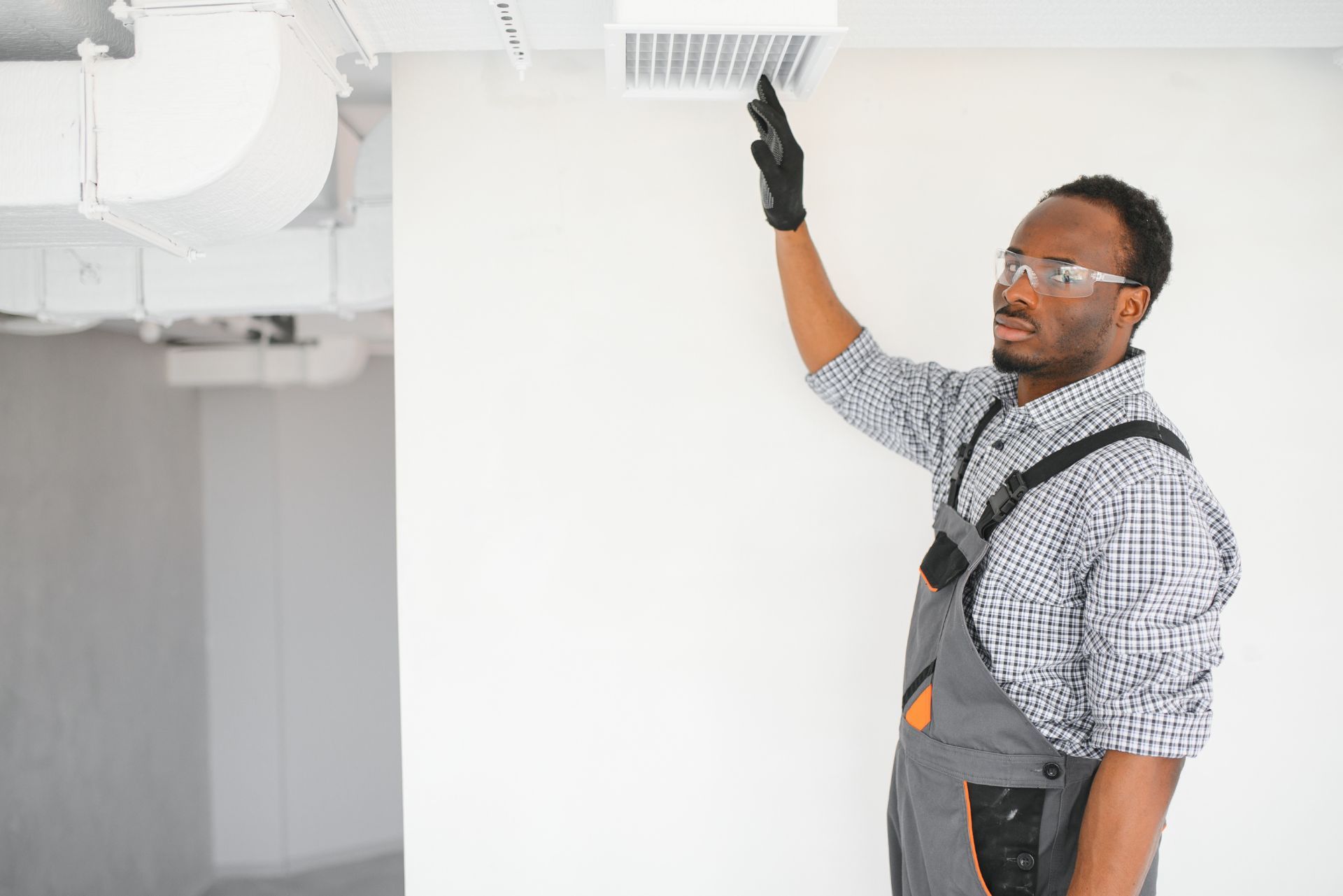Top 3 Recommended Policies

Wyoming’s HVAC contractors operate across wide distances and challenging weather conditions, from harsh winters in the mountains to hot, dry summers on the plains. Every project carries potential risks, including property damage, equipment breakdowns, and workplace injuries. Having the right insurance coverage in place is essential for protecting your business, your employees, and your clients. This guide explains how HVAC contractor insurance in Wyoming works, outlining the key coverage types, average costs, and industry challenges you should be aware of. Whether you are starting a new company or managing an established business, understanding your insurance options will help you plan effectively, stay compliant, and keep your operation running smoothly year-round.
Why HVAC Contractor Insurance is Crucial in Wyoming
HVAC work involves a variety of risks, from property damage to bodily injury, making insurance coverage indispensable. Wexford Insurance, a trusted provider in the region, emphasizes that "having the correct HVAC Contractor Insurance Policy... is super important to your business." Without proper coverage, even a minor accident could lead to significant financial strain or legal complications.
Wyoming’s unique environment, with its wide-open spaces and variable climate, also presents specific challenges. For example, HVAC contractors often work in extreme weather conditions, increasing the likelihood of accidents or equipment damage. Insurance helps mitigate these risks by covering unexpected costs that could otherwise cripple a business. Additionally, the rugged terrain and remote job sites can complicate logistics, making it even more crucial for contractors to have insurance that covers transportation and equipment loss or damage during transit.
Moreover, the HVAC industry in Wyoming is growing steadily. According to the IBISWorld Market Research Report, the industry is expected to reach a market size of $255.5 million by 2024, with 334 businesses currently operating in the state. This growth underscores the importance of being well-insured to remain competitive and resilient. As more contractors enter the market, having comprehensive insurance not only protects against potential liabilities but also enhances a company's reputation, making it more appealing to clients who prioritize safety and reliability.
Furthermore, the regulatory landscape in Wyoming is evolving, with increasing emphasis on safety standards and environmental regulations. HVAC contractors must navigate these complexities, and having the right insurance can provide peace of mind when it comes to compliance. Policies that include coverage for pollution liability, for instance, can protect contractors from claims related to refrigerant leaks or improper disposal of hazardous materials. This not only safeguards the contractor's financial health but also contributes to a safer environment for the communities they serve.

Types of Insurance Every Wyoming HVAC Contractor Should Consider
General Liability Insurance
General liability insurance is the cornerstone of any HVAC contractor’s insurance portfolio. It covers third-party claims related to bodily injury, property damage, and personal injury. For instance, if a client’s property is accidentally damaged during installation or repair, this insurance helps cover the costs of repairs or legal fees.
As noted earlier, the average cost for general liability insurance in Wyoming is about $3,200 annually for contractors with $150,000 in revenue. This cost is relatively reasonable when considering the protection it offers against potentially devastating lawsuits. Furthermore, having general liability insurance can enhance your business's credibility, as clients often prefer contractors who are insured, viewing this as a sign of professionalism and reliability.
Workers’ Compensation Insurance
Given the physical nature of HVAC work, workers’ compensation insurance is another critical coverage. It provides medical benefits and wage replacement to employees injured on the job, protecting both workers and employers.
Wyoming has one of the highest workers’ compensation rates for HVAC contractors, with an average cost per employee of $4,202, according to Contractor Nerd. This reflects the state’s commitment to ensuring injured workers receive adequate support but also highlights the importance of budgeting carefully for this expense. Additionally, some contractors may find that investing in safety training programs can reduce their workers’ compensation premiums over time, as a safer workplace leads to fewer claims and lower costs.
Commercial Auto Insurance
Many HVAC contractors rely on vehicles to transport tools and equipment to job sites. Commercial auto insurance covers vehicles used for business purposes, protecting against accidents, theft, and damage. Without this coverage, contractors risk significant out-of-pocket expenses if a vehicle is involved in an incident. Moreover, this insurance can also cover liability for injuries or damages caused by your vehicles, ensuring that your business is protected in the event of an accident.
In Wyoming, where the terrain can be unpredictable, having commercial auto insurance is particularly vital. The harsh weather conditions can lead to increased risks on the road, making it essential for contractors to be prepared for any eventuality. Additionally, some policies may offer coverage for roadside assistance, which can be invaluable for contractors who find themselves in need of help while on the job.
Equipment and Tools Coverage
HVAC contractors invest heavily in specialized tools and equipment. Insurance policies that cover theft, loss, or damage to these assets can be invaluable, especially given the costs of replacing or repairing essential tools. This coverage can also extend to equipment rented from other suppliers, ensuring that contractors are protected regardless of where their tools are sourced.
Moreover, with the increasing prevalence of theft in construction-related fields, having robust equipment and tools coverage can provide peace of mind. Many contractors opt for policies that include replacement cost coverage, which ensures they can replace stolen or damaged tools without incurring a significant financial burden. This is particularly important in a competitive industry where having the right tools can make all the difference in securing contracts and completing jobs efficiently.
Additional Coverages
Depending on the size and scope of your business, you may also consider professional liability insurance, business interruption insurance, or umbrella policies for extra protection. Consulting with an insurance expert can help tailor a policy that fits your specific needs. Professional liability insurance, for instance, can protect against claims of negligence or failure to deliver services as promised, which is crucial in a field where precision and expertise are paramount.
Business interruption insurance can also be a lifesaver, providing coverage for lost income during periods when your business cannot operate due to unforeseen circumstances, such as natural disasters or
equipment breakdowns. This type of coverage ensures that you can maintain your financial stability even when faced with significant disruptions. An umbrella policy can provide an additional layer of liability coverage, extending beyond the limits of your existing policies, which is especially beneficial for contractors working on larger projects or those with higher risk exposures.
How Insurance Costs Impact Wyoming HVAC Contractors
Insurance premiums are a significant operational cost for HVAC contractors in Wyoming. With general liability insurance averaging $3,200 annually for a $150,000 revenue business, and workers’ compensation costs averaging $4,202 per employee, these expenses can add up quickly. The unique geographical and climatic conditions of Wyoming, including harsh winters and unpredictable weather patterns, can further complicate the risk landscape, leading to increased insurance premiums. Contractors must navigate these challenges while ensuring they remain compliant with state regulations and adequately protected against potential liabilities.
Despite these costs, insurance is a necessary investment. Field Complete highlights that HVAC insurance is "essential for contractors" to protect against various risks, including lawsuits, property damage, and employee injuries. Without adequate insurance, a single claim could jeopardize the financial health of a business. Moreover, the nature of HVAC work often involves high-stakes situations where equipment failure or installation errors can lead to significant damages. In such cases, having robust insurance coverage not only safeguards the contractor’s assets but also provides peace of mind to clients, knowing that their investment is protected.
Contractors should also consider how insurance costs affect their pricing and competitiveness. Being transparent with clients about insurance coverage can build trust and demonstrate professionalism, which may justify higher rates. Additionally, some contractors may choose to bundle their insurance policies or seek out specialized coverage tailored to the HVAC industry, potentially reducing costs in the long run. By understanding the nuances of their insurance needs, contractors can strategically position themselves in the market, ensuring they remain competitive while still protecting their business interests.
Furthermore, the impact of insurance costs extends beyond immediate financial implications; it can also influence hiring practices and employee retention. High workers’ compensation costs may lead contractors to be more selective in their hiring, focusing on experienced technicians who can minimize risk. Conversely, offering comprehensive insurance benefits can be a powerful tool for attracting and retaining skilled workers in a competitive labor market. As the HVAC industry continues to evolve, contractors must remain vigilant in assessing their insurance needs and adapting their strategies to maintain both profitability and a strong workforce.

Industry Trends and Challenges Affecting HVAC Insurance in Wyoming
The HVAC industry in Wyoming is not immune to broader challenges impacting insurance markets. For example, the increasing frequency of natural disasters and climate-related events has put pressure on insurance providers, leading to higher premiums and stricter underwriting criteria.
A recent development in neighboring Idaho highlights this trend: in 2023, nearly 1 in 30 homeowners insurance policies were not renewed in Boise County, marking a significant increase from 2018, largely due to wildfire risks and climate change. While this statistic pertains to homeowners insurance, it signals a broader insurance market tightening that could eventually affect contractor insurance as well.
HVAC contractors should stay informed about these trends and work closely with their insurance providers to ensure their coverage remains adequate and affordable.
In addition to natural disasters, the HVAC industry is facing challenges related to labor shortages and rising material costs. Many contractors are struggling to find skilled technicians, which not only affects their ability to complete jobs on time but also impacts their overall operational costs. As demand for HVAC services continues to grow, particularly in the wake of increased energy efficiency regulations and the push for greener technologies, the pressure to hire and retain qualified personnel intensifies. This labor market strain can lead to delays in project timelines, which may, in turn, affect insurance claims and coverage needs.
Moreover, the evolving landscape of technology in the HVAC sector is creating both opportunities and challenges. The integration of smart home systems and advanced HVAC technologies requires contractors to adapt quickly, often necessitating additional training and investment. Insurance providers may also need to reassess their policies to account for new risks associated with these technologies, such as cyber threats or equipment malfunctions. As HVAC contractors navigate these complexities, it becomes increasingly important for them to engage in proactive risk management strategies and maintain open lines of communication with their insurers to mitigate potential liabilities.
Choosing the Right Insurance Provider for Your HVAC Business
Selecting the right insurance provider is as important as choosing the right coverage. Look for companies with experience in the HVAC industry and a strong reputation for customer service. Providers like Wexford Insurance specialize in HVAC contractor insurance and understand the unique risks contractors face in Wyoming. They are familiar with the specific challenges that HVAC businesses encounter, from equipment breakdowns to liability concerns, ensuring that their policies are tailored to meet these needs effectively.
When evaluating providers, consider factors such as policy flexibility, claims handling efficiency, and the availability of risk management resources. A good insurer can also provide guidance on minimizing risks, which can help reduce premiums over time. Additionally, it's beneficial to look for providers that offer comprehensive educational resources, such as workshops or online courses, that can help you and your team stay informed about best practices in safety and compliance. This proactive approach not only enhances your business's operational efficiency but also strengthens your relationship with the insurer, as they see you as a responsible partner committed to risk management.
Furthermore, don’t overlook the importance of customer testimonials and reviews when choosing an insurance provider. Hearing from other HVAC contractors about their experiences can provide valuable insights into how a company handles claims and supports its clients. Networking within industry forums or local trade associations can also yield recommendations for reliable insurers. Remember, the right insurance provider should not only offer competitive rates but also demonstrate a genuine commitment to supporting your business through tailored advice and responsive service.
Conclusion: Protecting Your Wyoming HVAC Business with the Right Insurance
Operating an HVAC business in Wyoming comes with its share of risks, but with the right insurance coverage, contractors can protect their livelihoods and focus on growth. From general liability to workers’ compensation and beyond, insurance is a critical component of a successful HVAC operation.
With the industry expected to grow to over $255 million by 2024 and employing more than 1,200 individuals statewide, investing in comprehensive insurance coverage is not just prudent—it’s essential. By understanding typical costs, coverage options, and industry trends, Wyoming HVAC contractors can make informed decisions that safeguard their business for years to come.
For more detailed insights into HVAC insurance and financial management, resources like the HVAC EBITDA & Valuation Multiples – 2025 Report offer valuable guidance tailored specifically to contractors.
Contact Us
HVACInsure is fully licensed and permitted to sell contractor and commercial insurance in Wyoming.
We proudly serve clients throughout Wyoming and maintain partnerships with local Wyoming insurance carriers to ensure HVAC professionals receive compliant, affordable, and comprehensive coverage that meets project and regulatory requirements.
HVACInsure Focuses on Wyoming HVAC Contractor Insurance
Cheyenne – Casper – Laramie – Gillette – Rock Springs – Sheridan – Green River – Evanston – Riverton – Jackson – Cody – Rawlins – Lander – Torrington – Powell – Douglas – Worland – Buffalo – Wheatland – Newcastle – Mills – Thermopolis – Lovell – Glenrock – Afton
Frequently Asked Question
Common HVAC Contractor Insurance Questions in Wyoming
These FAQs address common contractor questions. As HVACInsure grows, we will update this section with real client experiences and answers.
How does Wyoming's extreme weather affect my HVAC insurance?
Wyoming sees harsh winters and high winds. We cover emergency service, remote travel, and the challenges of extreme weather.
What coverage do I need for oil and gas industry HVAC work?
Wyoming's energy sector needs HVAC support. We cover drilling sites, processing facilities, and the specialized requirements involved.
Do I need special coverage for resort and tourism HVAC work?
Jackson Hole and Yellowstone gateway communities have high-end requirements. We cover resort and hospitality facility work.
What about coverage for Wyoming's vast distances?
Wyoming is large and empty. We structure coverage that addresses long travel times and remote service locations.
How do Wyoming's licensing requirements affect my insurance?
Wyoming contractor licensing varies by jurisdiction. We help you meet local requirements across your service area.
Can I get coverage for both resort areas and energy industry work?
Absolutely. Wyoming's economy has distinct sectors. We structure coverage that works for diverse operations.

Still have questions?
Can’t find the answer you’re looking for? Please chat to our friendly team!

About The Author: James Jenkins
I’m James Jenkins, Founder and CEO of HVACInsure. I work with HVAC contractors and related trades to simplify insurance and make coverage easier to understand. Every day, I help business owners secure reliable protection, issue certificates quickly, and stay compliant so their teams can keep working safely and confidently.
Recognized by National HVAC Trade Associations
These trusted organizations set best practices and standards that carriers rely on when underwriting HVAC risks.
Membership signifies adherence to HVAC industry standards and contractor best practices.


